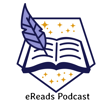
Connecting with Your Inner Muse: Insights from Kristina Smeriglio
Ad Information
Nom Nom
Offer Link:
zen.ai/4i9Aj6k_ufVc3HdgIOC1_w
Offer Code:
ereads
Offer Link:
zen.ai/SFBccsEWFCoFX_2c_pPQNw
Offer Code:
EREADSPODCAST
Description:
On this episode of the eReads Podcast, Kristina Smeriglio offers valuable advice on connecting with your muse. Learn about self-reflective practices that can enhance your creativity and writing skills.
Bio:
Kristina Smeriglio has always been fascinated by the complexities of the human experience. She strives to understand the roles of the mind and the heart, of the psyche and emotions, and so it has become the main theme of her work. Kristina focuses particularly on how the mind and our emotions are affected by our environment and experiences.
Kristina spends much of her time wondering about the human experience and exploring the age-old question, “why are we here?” She explored that same question and many others in her novel, Falling Into Fire, as she dove deep into The Garden of Earthly Delights, the painting by Hieronymus Bosch.
Kristina has a Master’s degree in Writing, a Bachelor’s in Psychology, and a license in Neuro-Linguistic Programming. She combines all this knowledge and wealth of experience in her writing and editing. She currently lives in Miami, FL, where she works as a copywriter and editor for entrepreneurs. Using a holistic approach, she helps clients get to the heart of their message so they can communicate it effectively and achieve their true intentions through writing.your reading pleasure.
Social Media Links:
Website: https://kristysmeriglio.com
Books
Book Title: Falling Into Fire
Connect with Liz
Website https://lizbullardwrites.com
Email: liz@Lizbullardwrites.com
Books
